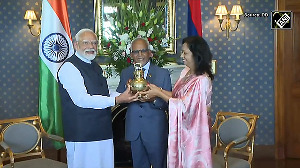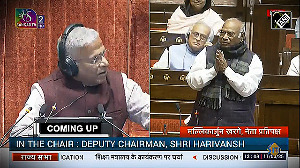The rate hike by the Reserve Bank will gently tighten money supply and help moderate inflation -- which is hovering close to 10 per cent, Finance Minister Pranab Mukherjee said on Tuesday.
He, however, also felt that inflation has peaked and would begin falling and be lower than the 5.5 per cent projected by RBI for this fiscal.
 "These policies should have a gentle impact in tightening money in the economy and should dampen further inflationary pressures," he told reporters in New Delhi.
"These policies should have a gentle impact in tightening money in the economy and should dampen further inflationary pressures," he told reporters in New Delhi.
The central bank on Tuesday hiked key short-term lending and borrowing rates (repo and reverse repo) and CRR, the portion of money banks park with it, by 25 basis points each. These moves are aimed at tempering demand for loans and would, in turn, check consumer spending.
The hike is part of the steady exit from the easy money policy that the RBI unveiled in the wake of the global financial meltdown in 2008. RBI began rolling back monetary stimulus in January when it hiked CRR to 5.75 per cent and later in March, it hiked repo and reverse repo by 0.25 percentage points each.
"If nothing untoward happens on the weather front, my belief is that overall inflation has peaked and should be on downward trajectory from now on," Mukherjee said.
Wholesale prices-based inflation was 9.90 per cent in March and is largely fed by food inflation, which is around 17 per cent. Food prices are on a high due to supply side constraints.
"My own belief based on analysis done in my ministry is that inflation is now on downward trajectory and in 2010-11 will be less than 5.5 per cent and in fact closer to four per cent with an upward bias," Mukherjee said.
The measures complement well the policies of the finance ministry aimed at controlling inflation and promoting sustainable growth, he said.
The RBI projected the economy to grow 8 per cent this fiscal.
"The well balanced measures, which involves raising the repo rate, reverse repo rate and CRR by 25 bps each reflect a mature and balanced view of the needs of our economy and I fully endorse the measures," Mukherjee said.
India has now bounced back with growth seemingly back on track and inflation, though high, on a clear downward trend, he said.
"Hence I believe that it is time to move back towards 'neutral' policy rates that is rates should prevail when an economy is stable and on track," he said.





 © 2025
© 2025